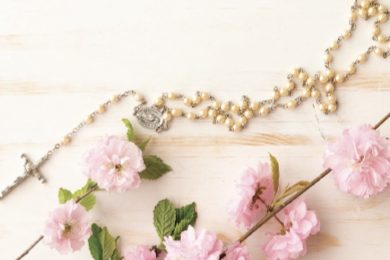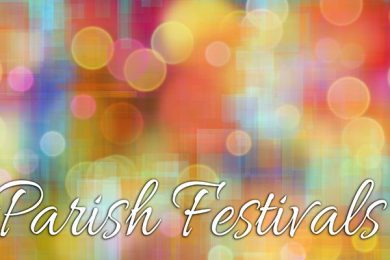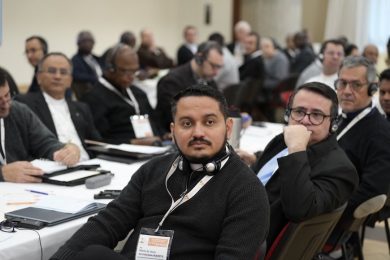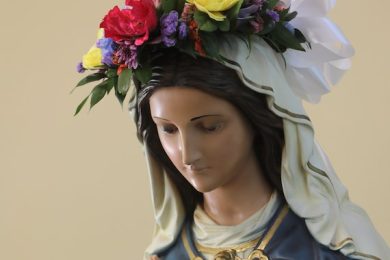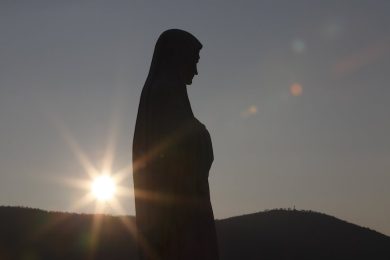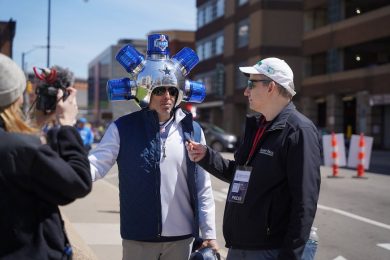Relics of St. Thomas More and St. John Fisher, two 16th-century martyrs who exemplified courage and conviction in the face of persecution, are coming to St. Mary’s Cathedral in St. Cloud June 27 as part of the “Strength of the Saints” relic tour.
 Bishop Donald Kettler will celebrate a holy hour at the cathedral starting at 7:30 p.m. to pray for religious freedom. There will be an opportunity to venerate the relics at the holy hour.
Bishop Donald Kettler will celebrate a holy hour at the cathedral starting at 7:30 p.m. to pray for religious freedom. There will be an opportunity to venerate the relics at the holy hour.
Prior to the event, the two-hour movie “A Man for All Seasons” (1966), about St. Thomas More, will be shown at 5:15 p.m. in the basement of the cathedral. Light refreshments will be available.
The Minnesota Catholic Conference is organizing the relic tour, which includes stops in each of Minnesota’s six dioceses between June 26 and June 28.
It’s one leg of a nationwide tour of More’s and Fisher’s relics sponsored in part by the Knights of Columbus and organized by the U.S. Conference of Catholic Bishops.
The Minnesota visit comes in the middle of the Fortnight for Freedom — June 21 to July 4 — an observance that highlights the importance of defending religious freedom. This year’s theme is “Witnesses to Freedom.”
The relics include a piece of bone from St. Thomas More enclosed in a 16th-century crystal-and-silver reliquary, and St. John Fisher’s signet ring set with a cameo of Aristotle.
The relics will travel with Jan Graffius, curator of collections at Stonyhurst College, a Jesuit school in Clitheroe, England, where they are kept.
“Relics are reminders of people we love,” Graffius said. “Parents keep baby shoes, locks of hair [and] birthday cards as reminders of those who are important to us. A physical object such as the More relic reminds us that he was a human being, and by viewing it, we find ourselves closer to him as a person.
“It is a prompt for reflection, examination and inquiry,” she said. “And, hopefully, that experience can bring us closer to Thomas More and John Fisher as human beings and encourage us to learn more about them.”
Graffius said More’s skull was rescued by his daughter, Margaret, from a spike on London Bridge. There are very few bone relics of More, and this one came to the college through descendants of Margaret, she said.
“The ring is important because it was a personal possession of John Fisher, and there are very few items belonging to him in existence,” Graffius said. “The cameo of Aristotle reminds us that Fisher was a great scholar and a humanist, and that the church has long depended on Aristotle’s explanation of physical appearances to help explain transubstantiation.”
Graffius, who works with schoolchildren, said the most powerful teaching aid is a real object they can experience firsthand. 
“To be close to More and Fisher’s relics is to bring their world closer to us,” she said. “My experience is that most people are deeply moved when they see these relics and the many hundreds of others that we look after at Stonyhurst. It is a tangible reminder of the sacrifices made by our ancestors centuries ago.”
A fundamental freedom
All people have a right to worship and practice their faith according to their consciences.
“That’s religious freedom,” said Barry Hudock, who works as a publisher at Liturgical Press in Collegeville and is the author of “Struggle, Condemnation, Vindication: John Courtney Murray’s Journey toward Vatican II,” a recent book on how the Catholic Church came to its present teaching on religious freedom.
“The First Amendment to the U.S. Constitution defends it, the United Nations Declaration of Human Rights insists upon it and, more recently, the Catholic Church proclaims it,” he said.
Over the last several years, the U.S. bishops have taken “an intense interest” in the issue of religious freedom, in part because of concern over the way the federal government mandated coverage of contraception by health insurance plans when it implemented the Affordable Care Act, Hudock said.
“The bishops are right to be troubled, and everyone should be, because a government that can ignore conscience protections for one group can ignore it for others, too,” he said.
Jason Adkins, executive director of the Minnesota Catholic Conference, the official public policy voice of the state’s bishops, said U.S. bishops are “rallying American Catholics to reflect on the importance of religious liberty because this cherished right is under serious attack, both at home and abroad.”
“Domestically, government at all levels is trying to force organizations and individuals to violate their deep-seated convictions as a requirement for full participation in society,” Adkins said.
“Those who do not comply often find their vocation to public service thwarted by the state,” he said, “as we have seen with adoption agencies who have refused to place children in homes without a mother and father, small businesses owners who decline to participate in same-sex ‘wedding’ ceremonies, and religious institutions and orders who refuse to comply with the Obama administration’s contraception mandate.”
The government is “essentially telling people of faith that their religious beliefs are all right on Sundays if they’re kept in church, but aren’t welcome at work or in the public square,” Adkins said.
The most troubling aspect of these abuses of religious liberty, he added, is that they are being perpetrated by the very government established to protect this first and fundamental freedom.
Concerns about religious liberty extend to other issues as well, Hudock said.
“Here in the U.S. recently, we’ve seen local and state governments try to interfere with the church’s ministry to migrants and refugees. And we have a presidential candidate calling for a complete ban on people entering the country based solely on religion,” he said. “And frankly, all of this pales in comparison to threats to religious freedom faced by people in other parts of the world.”
Adkins said that, internationally, threats to religious liberty are very troubling.
“Christians and others are not only prevented from practicing their faith, but in some cases are persecuted and killed because of it,” he said. “The atrocities committed against Christians in the Middle East are particularly appalling, and Christians suffer other assaults against their physical persons in countries like China and Pakistan.”
Standing up for one’s faith isn’t always easy, but Minnesota Catholics have a unique opportunity to draw strength from those who already have, Adkins said.
“Sts. Thomas More and John Fisher are powerful intercessors, who are ready and willing to support the faithful now as we stand up for religious liberty,” he said.
“In addition to their intercession, these saints provide us with a powerful example of what it takes to stay true to your conviction in the face of persecution and even death: steadfast prayer and unshakable faith in God,” Adkins said. “Both men lived lives of devotion and piety that provided them strength when they were tested.
“Let’s hope that we’ll never face persecution for our faith,” he said, “but pray that we’ll have the same resolve and trust in God to endure it if we must.”

